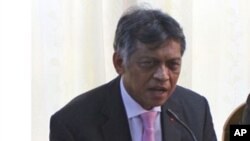The secretary-general of the Association of Southeast Asian nations, Surin Pitsuwan, says Burma appears committed to reforms but needs to prove it to meet international expectations. He gave an assessment Friday of Burma’s political progress following a visit there this week.
Surin said he thinks Burma’s leaders are committed to further economic and political reforms as long as they can control the process.
"Just like any government that has been centralized and authoritarian would like to open up, if you don’t want to confront instability and tension and confrontation right away you have to be rather measured about it. And, I think they are determined to do that," he said.
Surin made the comments at the Foreign Correspondents Club of Thailand during a stopover in Bangkok on day three of a four-day visit to Burma.
Political progress
During his visit he met with President Thein Sein and other government leaders who he says recognize the challenges and opportunities of reforming the country.
The ASEAN leader also met for the first time with opposition leader Aung San Suu Kyi and her National League for Democracy. He says the party’s participation in free and fair elections in April would be an extremely crucial test for international confidence in the reform process.
"Precisely for that reason the international community is waiting for signals from inside whether this is going to be sustained, whether this is going to lead to more opening, or whether this is just a mirage," he said.
Burma is considering allowing ASEAN election observers as they did for the 2010 election that ended overt military rule.
But, even if allowed, Surin acknowledged ASEAN was not the best organization for sharing or monitoring democracy in Burma.
"To be fair, to be frank, to be truthful, the credit is not that A-plus. But, it is a beginning. It is a commitment," he said. "It is a recognition that without some indicators coming from outside, measured from outside, it’s going to be difficult to convince the world that it has made some changes."
Hosting ASEAN meetings
ASEAN’s ten members include developing democracies but also an absolute monarchy, Brunei, and two communist one-party states-Laos and Vietnam.
Aside from Burma, the other members are Cambodia, Indonesia, Malaysia, the Philippines, Singapore, and Thailand.
Surin said Burma’s hosting of ASEAN meetings in 2014 would help ensure it does not turn back on reform efforts. But he also noted serious preparations were needed in the country, as known as Myanmar, including improving roads, telecommunications and Internet, sufficient hotel space, and a stable banking and financial system.
"If Myanmar is going to carry out its chairmanship fully, responsibly, effectively, successfully, many many things have to happen within the next two years," he said.
For one thing, Surin said Burma’s largely cash-only finance system would have to go. He said such as system is not adequate to support hosting a year of high-profile economic and political meetings that are the responsibility of the ASEAN chair.




